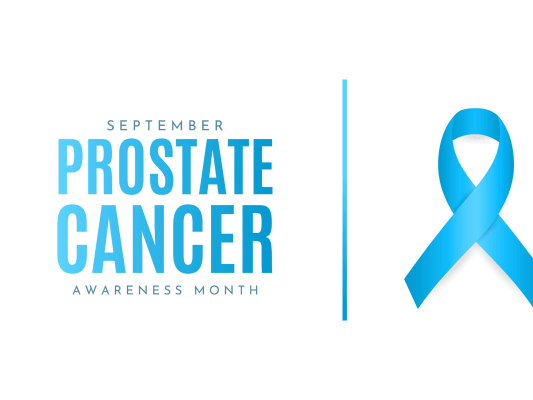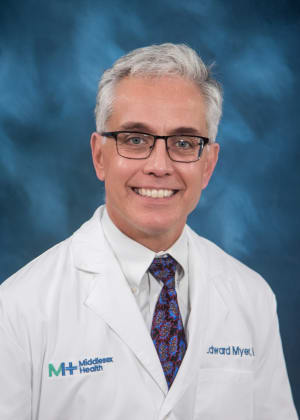Mark Prostate Cancer Awareness Month By Scheduling Your Screening

The American Cancer Society estimates that there will be 268,490 new cases of prostate cancer in the United States this year. Aside from skin cancer, prostate cancer is the most common cancer in American men. About 1 man in 8 will be diagnosed with prostate cancer during his lifetime, but while a serious disease, most men will not die from it.
The late Arnold Palmer, most known for his success on the golf course, became a leading advocate for prostate cancer following his diagnosis in the 1990s. As a result, he spent the latter part of his life encouraging men to get screened regularly for prostate cancer - an important message that is still relevant today. He also helped establish the Arnold Palmer Prostate Center in California, which provides cancer treatment to those who need it.
Prostate cancer often has no symptoms. That’s what makes it so important for men to be screened by their doctor. Screenings can include a digital rectal exam or a PSA test, which involves a blood sample, and these screenings can help identify prostate cancer when it is still localized to the prostate.
Annual PSA tests are what helped Palmer, who reportedly did not experience any cancer symptoms. Each year, his PSA test scores increased, and his doctors eventually took a biopsy. The biopsy did not show cancer, but those scores continued to rise, prompting Palmer’s medical care team to take a second look. Cancer was found in its early stages and was treatable.
What is prostate cancer?
Prostate cancer is cancer that occurs in the prostate, a walnut-shaped gland in men that produces the seminal fluid that nourishes and transports sperm. It’s not clear what causes prostate cancer, but risk factors include your age, race, family history and whether you are affected by obesity.
More advanced prostate cancer symptoms can include trouble urinating, pelvic area pain, back pain or bone pain.
How do you treat prostate cancer?
For men with low-risk prostate cancer, physicians may opt for active surveillance. Surgery to remove the prostate is also a possible treatment for prostate cancer patients, or they may receive radiation therapy.
Middlesex Health Cancer Center offers the SpaceOAR System, as appropriate, to prostate cancer patients who receive radiation therapy. This system uses an injectable gel to create a temporary space between the prostate and rectum. This space limits the impact of radiation to the gastrointestinal system and lowers the risk of side effects while ensuring that the full dose of radiation is delivered to the prostate gland.
When Palmer was diagnosed with prostate cancer, he chose to have a radical prostatectomy, which removed his entire prostate, and then radiation therapy. Following his treatment, he was back on the Senior PGA Tour, retiring in 2006. He remained in remission for the rest of his life, dying in 2016 at age 87 - nearly 20 years after his battle with prostate cancer.
More About Middlesex
Middlesex Health urologists collaborate with radiation oncologists to treat patients who have prostate cancer. At Middlesex Health Cancer Center, a nurse navigator is available to help patients with their care from diagnosis through treatment.
For more information about prostate cancer, including screening, diagnosis and treatment, click here.
Note: Middlesex Health urologists also diagnose and treat other conditions, such as an enlarged prostate. Many men have an enlarged prostate. It is a common medical problem that can greatly impact their quality of life, possibly preventing them from fully emptying their bladder and causing other issues.
Aquablation therapy is an innovative treatment option for those with enlarged prostate that is available at Middlesex Health. It uses real-time ultrasound and high-velocity water jets to treat lower urinary tract symptoms due to an enlarged prostate. Aquablation therapy can be used on most prostates, including very large ones.

Richard O. Frink, MD
Specialties / Areas of Care
- Urology
- Surgical Oncology
Locations
- Middletown, CT
860-358-2270
- Madison, CT
860-358-2270
- Marlborough, CT
860-358-2270
- Westbrook, CT
860-358-2270
- View Full Profile
- Accepting New Patients

Dana U. Kivlin, DO
Specialties / Areas of Care
- Urology
- Surgical Oncology
Locations
- Middletown, CT
860-358-2270
- Marlborough, CT
860-358-2270
- Westbrook, CT
860-358-2270
- View Full Profile
- Accepting New Patients

Edward G. Myer, MD
Specialties / Areas of Care
- Urology
- Surgical Oncology
Locations
- Middletown, CT
860-358-2270
- Marlborough, CT
860-358-2270
- Westbrook, CT
860-358-2270
- View Full Profile
- Accepting New Patients

Timothy C. Siegrist, MD
Specialties / Areas of Care
- Urology
- Surgical Oncology
Locations
- Middletown, CT
860-358-2270
- Marlborough, CT
860-358-2270
- Westbrook, CT
860-358-2270
- View Full Profile
- Accepting New Patients
More Stories
Beware of the Mosquito!
It’s common to find mosquitoes on the golf course, especially in the brush, in wooded areas or near water, and they can be a nuisance — and a health risk.
Making a Difference One Golf Swing at a Time
June was a busy month for Middlesex Health. In addition to providing excellent care every day for patients, celebrating Pride Month and marking Juneteenth, the health system was at the golf course supporting the community!